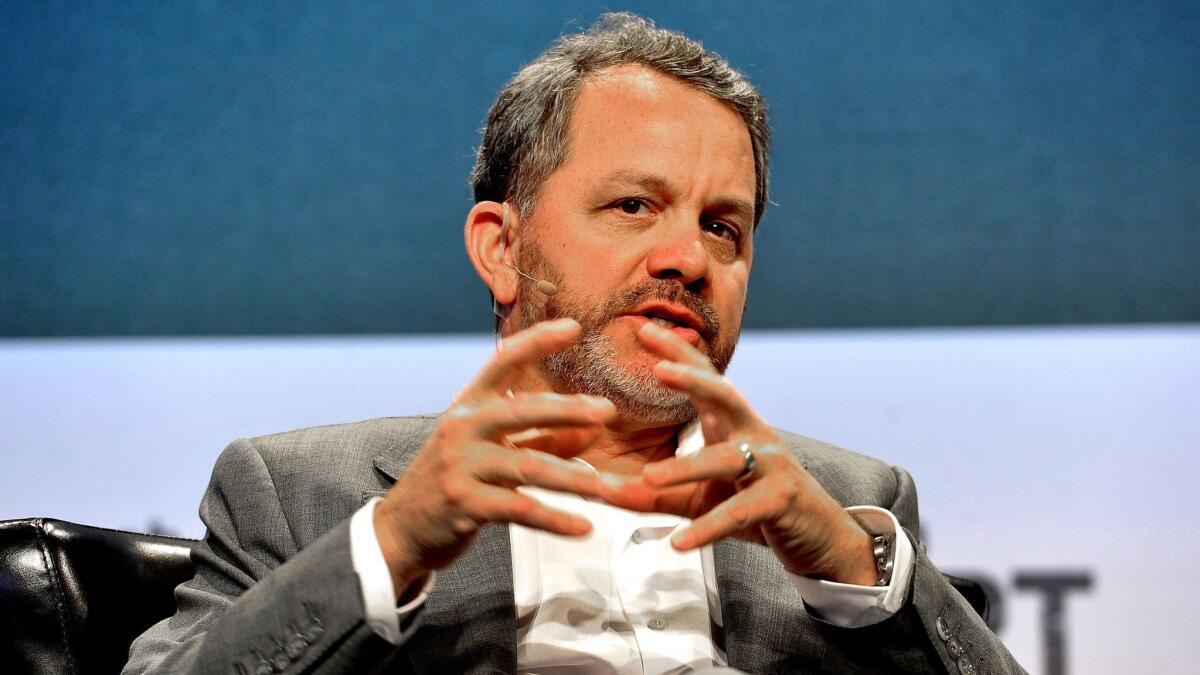How one wealthy parent is defending himself in college admissions scandal

- Share via
Legal experts have said some of the parents accused in the far-reaching college admissions scandal have an uphill battle because of the evidence provided by the mastermind of the scheme, who is cooperating with authorities.
Prosecutors have some defendants on wiretaps talking about cheating and bribes aimed at getting their kids into elite colleges, court records show. There also are documented emails as well as checks and financial transfers for payments to William “Rick” Singer’s charity and businesses owned by several coaches linked to the scam.
The case centered on a Newport Beach college placement firm run by Singer. Wealthy parents are accused of paying Singer to help their children cheat on college entrance exams and to falsify athletic records of students to enable them to secure admission to elite schools, including UCLA, USC, Stanford, Yale and Georgetown, court records show.
Law enforcement sources said the parents are facing pressure from prosecutors to cooperate. One source said some of the parents are being given a short window to consider a deal or potentially face additional charges. The investigation is ongoing, and more charges are expected.
But we are beginning to get some sense of how parents plan to push back against the allegations.
This week, Bill McGlashan, the former managing partner of San Francisco-based TPG Growth, has sought to rebuff federal prosecutors who allege he discussed a $200,000 bribe with a college athletic director to get his son into USC.
The defense
“Mr. McGlashan did not pay for the use of a so-called ‘side door’ to obtain admission for his son at USC or any other college,” his lawyers wrote in a court filing seeking to allow him to travel for business as well as on an international family vacation.
His attorneys, Jack W. Pirozzolo and John C. Hueston, argued that their client differs from all the other parents caught up in the scandal. McGlashan, who has pleaded not guilty, says he paid Singer $50,000 for legitimate college counseling services for his son.
His attorneys argue that his son was diagnosed with a learning disability in 2015 and needed more time to take the ACT exam.
Court records show that McGlashan’s son submitted a doctored ACT score to Northeastern University in Boston.
But his legal team says the boy withdrew his applications to college and hasn’t even graduated from high school.
“There is no allegation that Mr. McGlashan’s son ever attended a university based on any of the alleged conduct,” Pirozzolo said.
What prosecutors say
Federal prosecutors, however, tell a different story. They allege that McGlashan paid $50,000 in December 2017 to a charity controlled by Singer and say the money was given three days before his son took an ACT exam at a site managed by Singer in West Hollywood — hundreds of miles from their Northern California home. Authorities say the test was then “corrected” by one of Singer’s paid associates. McGlashan’s son, according to prosecutors, scored a 34 out of 36.
And McGlashan discussed repeating the scheme in July 2018, officials say. He said he would get a doctor to make a diagnosis that would also get his younger children more time on the test and open the door to their using the West Hollywood testing center, according to prosecutors.
The legal issues
Most of those named in the federal charges, including all of the nearly three dozen mothers and fathers, have been charged with a count of conspiracy to commit mail or wire fraud.
To prove it, the government must answer a basic question: Who, exactly, was defrauded — and of what property — when parents allegedly paid Singer to finagle their children into universities with falsified exams and fake athletic credentials?
The answer is not as clear-cut as it may seem. Judges have long wrestled with a clear understanding of what is — and isn’t — property in the eyes of the law.
“What constitutes property has always been contested,” said Ellen Podgor, an expert on white-collar crime at Stetson University. “It’s a moving target.”
To bolster the claims that admission to a university or college is property, prosecutors pointed in their filing to a 1997 case in another federal court district, in which an appeals panel found that professors defrauded the University of Tennessee when they gave graduate students advanced degrees in exchange for help winning government contracts.
Typically, attorneys will cite recent cases in their own district if any exist when trying to shore up a legal argument. Legal experts said the government relying on a two-decade-old case far from Boston could give the judge more room to reconsider the issue.
Mail fraud has been a crime in the United States since the 19th century and is a sweeping charge that makes it illegal to use the Postal Service to carry out “any scheme or artifice to defraud.” Later, lawmakers broadened the scope to include “wire fraud,” which involves email and other forms of electronic communication.
More to Read
Sign up for Essential California
The most important California stories and recommendations in your inbox every morning.
You may occasionally receive promotional content from the Los Angeles Times.














